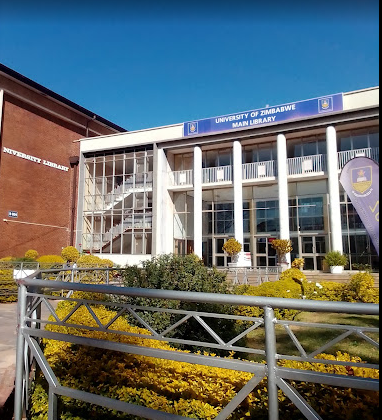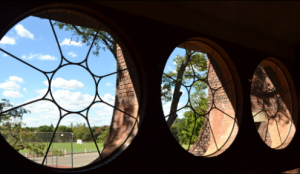The Essentials
Type of Institution: University
Fees per semester: US$500.00 to US$1 000.00
Address: P Bag MP167 Mt Pleasant, Harare, Zimbabwe
Phone Number: +263 4303211
Chancellor: E.D Mnangagwa
Vice Chancellor: Prof. Paul Mapfumo
Number of students:10 000+
Website: https:// www.uz.ac.zw/
Email: infor@admin.uz.ac.zw
Table Of Contents
- Overview
- Contact Details
- Address
- Location
- School Fees
- Courses & Programs
- Vacancies and Entry Requirements
- Logo
- Notable Alumni
- Pros and Cons
- Author’s Review
Overview
History and Location
Established: 1952
Location: Harare, Zimbabwe
Type: Public University
Motto: “Knowledge, Diligence, Integrity”
Campus and Facilities
Main Campus: Located in Mount Pleasant, Harare, the campus features modern infrastructure, green spaces, and a range of facilities.
Facilities: State-of-the-art lecture halls, laboratories, libraries, student accommodation, sports facilities, and health services.
Academics
Faculties: UZ comprises several faculties offering diverse programs:
*Faculty of Agriculture
*Faculty of Arts and Humanities
*Faculty of Commerce
*Faculty of Education
*Faculty of Engineering
*Faculty of Health Sciences
*Faculty of Law
*Faculty of Science
*Faculty of Social Studies
*Faculty of Veterinary Science
Programs: Offers undergraduate, postgraduate, and doctoral programs across a wide array of disciplines.
Research and Innovation
Research Centers: UZ hosts numerous research institutes and centers, contributing to significant advancements in various fields.
Collaborations: Engages in partnerships with local and international institutions, enhancing research capabilities and academic exchanges.
Student Life
Student Organizations: A vibrant array of clubs and societies cater to academic, cultural, and recreational interests.
Support Services: Comprehensive support services including counseling, career guidance, health services, and academic advising.
Community Engagement
Outreach Programs: Active in community development projects, providing students with practical experience and contributing to societal well-being.
Vision and Mission
Vision: To be a leading center of excellence in university education and research in Africa.
Mission: To produce graduates who are innovative, entrepreneurial, and equipped to contribute to the sustainable development of society.
Notable Achievements
Alumni: UZ boasts a distinguished alumni network, including prominent leaders in various sectors such as politics, business, and academia.
Accreditation: Accredited by the Zimbabwe Council for Higher Education (ZIMCHE) and recognized internationally.
Challenges
Resource Constraints: Faces challenges related to funding and infrastructure maintenance.
Economic Conditions: The broader economic situation in Zimbabwe can impact university operations and student experiences.
University of Zimbabwe Contact Details
You can contact University of Zimbabwe via their landline, email or you can visit their website for further contact details.
Phone Number: +263 4303211
Website: https:// www.uz.ac.zw/
Email: infor@admin.uz.ac.zw
University of Zimbabwe Address
P Bag MP167 Mt Pleasant, Harare, Zimbabwe
University of Zimbabwe Location
University of Zimbabwe’s main campus is located in the capital of Zimbabwe on the suburb of Mount Pleasant.
University of Zimbabwe Fees
University of Zimbabwe’s fees is currently standing at US$500.00 to US$1 000.00 per semester depending on the program you are studying and the level of degree you are studying. Please contact the institution or visit them to get the latest fees structure as it can change at any term or semester.
University of Zimbabwe Courses & Programs
The University of Zimbabwe (UZ) offers a comprehensive range of courses and programs across various faculties.
Faculty of Agriculture
Bachelor of Science in Agriculture: Specializations in Animal Science, Crop Science, Agricultural Economics, Soil Science, and Horticulture.
Bachelor of Science in Environmental Science
Master of Science in Agricultural Economics
Master of Science in Crop Science
Doctor of Philosophy (PhD) in various agricultural disciplines
Faculty of Arts and Humanities
Bachelor of Arts: Majors in English, History, Linguistics, Philosophy, Religious Studies, and Shona.
Bachelor of Arts in Media Studies
Bachelor of Arts in Music
Master of Arts in African Languages and Literature
Master of Arts in Development Studies
Doctor of Philosophy (PhD) in Humanities
Faculty of Commerce
Bachelor of Commerce in Accounting
Bachelor of Commerce in Business Studies
Bachelor of Commerce in Finance
Bachelor of Commerce in Marketing
Master of Business Administration (MBA)
Master of Commerce in Strategic Management
Doctor of Philosophy (PhD) in Commerce
Faculty of Education
Bachelor of Education in Early Childhood Development
Bachelor of Education in Primary Education
Bachelor of Education in Secondary Education
Bachelor of Education in Educational Management
Master of Education in Curriculum Studies
Doctor of Philosophy (PhD) in Education
Faculty of Engineering
Bachelor of Engineering in Civil Engineering
Bachelor of Engineering in Electrical Engineering
Bachelor of Engineering in Mechanical Engineering
Bachelor of Engineering in Mining Engineering
Master of Engineering in various disciplines
Doctor of Philosophy (PhD) in Engineering
Faculty of Health Sciences
Bachelor of Medicine and Bachelor of Surgery (MBChB)
Bachelor of Science in Nursing
Bachelor of Science in Medical Laboratory Sciences
Bachelor of Science in Radiography
Master of Public Health (MPH)
Master of Science in Clinical Epidemiology
Doctor of Philosophy (PhD) in Health Sciences
Faculty of Law
Bachelor of Laws (LLB)
Master of Laws (LLM)
Doctor of Philosophy (PhD) in Law
Faculty of Science
Bachelor of Science in Biological Sciences
Bachelor of Science in Chemistry
Bachelor of Science in Computer Science
Bachelor of Science in Mathematics
Bachelor of Science in Physics
Master of Science in Biochemistry
Master of Science in Environmental Science
Doctor of Philosophy (PhD) in various scientific disciplines
Faculty of Social Studies
Bachelor of Science in Economics
Bachelor of Science in Political Science
Bachelor of Science in Psychology
Bachelor of Science in Sociology
Bachelor of Science in Social Work
Master of Science in International Relations
Doctor of Philosophy (PhD) in Social Sciences
Faculty of Veterinary Science
Bachelor of Veterinary Science (BVSc)
Master of Veterinary Science (MVSc)
Doctor of Philosophy (PhD) in Veterinary Science
Postgraduate Programs
Master’s Degrees: Various specializations across all faculties.
Doctoral Programs (PhD): Available in numerous fields, fostering advanced research and academic excellence.
University of Zimbabwe Vacancies and Entry Requirements
Undergraduate Programs
General Entry Requirements:
Ordinary Level (O-Level) Passes: Five O-Level passes, including English Language and Mathematics, with grades C or better.
Advanced Level (A-Level) Passes: At least two A-Level passes in relevant subjects.
Mature Entry: Applicants who are at least 25 years old with relevant work experience and O-Level passes may be considered for mature entry.
Specific Program Requirements:
Faculty of Agriculture
Bachelor of Science in Agriculture: A-Level passes in at least two of the following subjects: Biology, Chemistry, Mathematics, Physics, or Geography.
Faculty of Arts and Humanities
Bachelor of Arts Programs: A-Level passes in at least two subjects relevant to the chosen major (e.g., English, History, Religious Studies).
Faculty of Commerce
Bachelor of Commerce Programs: A-Level passes in Mathematics and one commercial subject (e.g., Accounting, Business Studies, Economics).
Faculty of Education
Bachelor of Education Programs: A-Level passes in subjects relevant to the intended teaching area. Teaching diplomas may also be considered.
Faculty of Engineering
Bachelor of Engineering Programs: A-Level passes in Mathematics and Physics, with a strong background in Chemistry or a relevant technical subject.
Faculty of Health Sciences
Bachelor of Medicine and Bachelor of Surgery (MBChB): A-Level passes in Chemistry, Biology, and either Mathematics or Physics.
Bachelor of Science in Nursing: A-Level passes in Biology and one other science subject.
Faculty of Law
Bachelor of Laws (LLB): At least three A-Level passes with high grades in relevant arts or science subjects.
Faculty of Science
Bachelor of Science Programs: A-Level passes in relevant science subjects, such as Mathematics, Biology, Chemistry, or Physics.
Faculty of Social Studies
Bachelor of Science Programs: A-Level passes in relevant subjects such as Geography, Sociology, or Psychology.
Faculty of Veterinary Science
Bachelor of Veterinary Science (BVSc): A-Level passes in Chemistry, Biology, and either Mathematics or Physics.
Postgraduate Programs
General Entry Requirements:
Bachelor’s Degree: A relevant bachelor’s degree from a recognized institution with at least a second-class pass or equivalent.
Work Experience: Some programs may require relevant work experience, particularly for professional and executive programs like the Master of Business Administration (MBA).
Specific Program Requirements:
Faculty of Arts and Humanities
Master’s Programs: A relevant undergraduate degree with a good academic record. Some programs may require a research proposal.
Faculty of Commerce
Master of Business Administration (MBA): A relevant undergraduate degree and substantial work experience.
Faculty of Health Sciences
Master of Public Health (MPH): A relevant undergraduate degree and professional experience in a health-related field.
Doctoral Programs (PhD)
General Requirements:
A relevant master’s degree from a recognized institution. A detailed research proposal may also be required.
Vacancies
The University of Zimbabwe announces vacancies for various programs during their enrollment periods. Prospective students should check the university’s official website or contact the admissions office for the most up-to-date information on available programs and specific entry requirements.
Application Process
Application Form: Complete and submit the UZ application form, which can be obtained from the university’s admissions office or downloaded from their official website.
Supporting Documents: Submit copies of academic certificates, national ID or passport, and any other required documents.
Application Fee: Pay the non-refundable application fee as specified by the university.
Submission: Submit the completed application form and supporting documents to the UZ admissions office by the specified deadline.
Important Notes
Admission requirements and procedures may vary slightly depending on the program and changes in university policies. Always refer to the official UZ website or contact the admissions office for the most current and detailed information.
University of Zimbabwe Logo
Below are the logos of University of Zimbabwe with excellent quality and it is available to download in PNG (transparent file) JPEG and PDF.
University of Zimbabwe Notable Alumni
Nelson Chamisa – Former president of CCC, lawyer, former minister of Information and Communications Technology
Welshman Ncube – Lawyer, Businessman, Proffessor, former member of parliament, former minister
Gideon Gono – Banker, Former governor of the RBZ, Politician
Tendai Biti – Lawyer, Former member of parliament, former minister of finance
Levi Nyagura – Mathematician, Former Vice Chancellor of UZ
Fortune Chasi – Lawyer, member of parliament
Oppah Muchinguri – Politician, Former minister
Lucian Msamati – British-Tanzanian actor
Xoliswa Sithole – Actress
University of Zimbabwe Pros and Cons
Pros
Reputation and Legacy: The University of Zimbabwe is the oldest and most prestigious university in the country, known for its high academic standards and distinguished alumni network.
Wide Range of Programs: Offers a comprehensive array of undergraduate, postgraduate, and doctoral programs across various faculties, providing students with numerous academic options.
Research Opportunities: Strong emphasis on research and innovation with numerous research institutes and centers, fostering a culture of academic inquiry and advancement.
Experienced Faculty: Boasts a team of experienced and qualified lecturers and professors who are dedicated to providing quality education and mentoring students.
Modern Facilities: Equipped with state-of-the-art laboratories, libraries, sports facilities, and lecture halls, creating a conducive environment for learning and personal development.
Community Engagement: Actively involved in community development projects and outreach programs, allowing students to gain practical experience and contribute positively to society.
Career Services: Comprehensive career guidance and support services to help students prepare for the job market, including internships, job placements, and career fairs.
Student Life: A vibrant campus life with numerous student organizations, clubs, and societies catering to a wide range of interests and fostering personal growth and networking.
International Collaborations: Engages in partnerships with international universities and organizations, enhancing academic exchange and research opportunities.
Alumni Network: A strong and influential alumni network that provides mentorship, networking opportunities, and support to current students and recent graduates.
Cons
Resource Constraints: Faces challenges related to funding and resources, which can impact infrastructure maintenance and the availability of certain facilities.
Large Class Sizes: Some programs may have large class sizes, potentially affecting the level of individual attention students receive from lecturers.
Administrative Delays: Occasional delays in administrative processes such as registration, issuance of transcripts, and other student services.
Accommodation Issues: Limited on-campus accommodation may force some students to seek housing off-campus, which can present additional logistical and financial challenges.
Economic Challenges: The broader economic situation in Zimbabwe can affect university operations and the overall student experience, including issues like inflation and access to essential services.
Technology Infrastructure: While efforts are being made to modernize, there may still be gaps in technology infrastructure, particularly in terms of internet connectivity and access to digital resources.
Location-Specific Challenges: The location of the main campus in Harare may present challenges related to urban congestion and higher living costs for students from other regions.
Author's Review
The University of Zimbabwe offers a comprehensive and prestigious educational experience with a wide range of programs, strong research opportunities, and a vibrant student life. However, it faces challenges common to many institutions in the region, such as resource constraints and administrative delays.
Prospective students should weigh these factors and consider their personal needs and circumstances when deciding to enroll at UZ. Overall, the university remains a top choice for higher education in Zimbabwe, known for its academic excellence and significant contributions to society.




